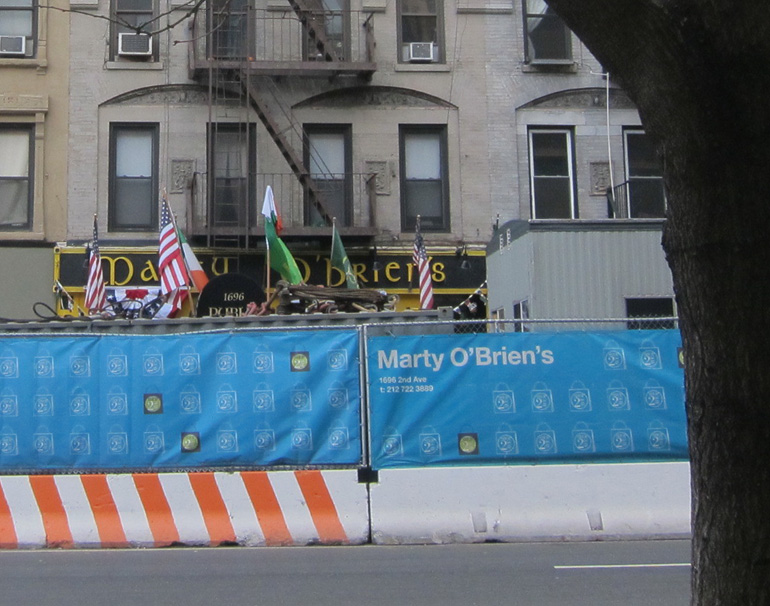Gotham Diary:
Mending?
2 April 2013
Tuesday, April 2nd, 2013
Last Thursday, I recall, I urged readers not to worry that I was having a “low day,” because I was fine, really. This turned out not to be true. But I’ll be damned if I can say how sick I was, or with what ailment. I doubt that it was simply one. Friday and Saturday, I was good for very little. When I woke up feeling generally “all right” on Sunday, I decided to go ahead with Easter dinner. And it all went well enough, even if my timing dragged a bit. I owe the success of the afternoon entirely to my guests, who kept up a genial and inspiring buzz throughout. But by Sunday night, having washed the dishes but not the crystal, I felt the beginnings of a sore throat. This continued to bother me yesterday. It faded in the evening and seems now to be gone. But the stitch in the left side of my diaphragm (if that’s what it is) continues to come and go. I’ll be seeing the doctor for a physical exam next week, and I expect that I’ll live that long.
The most palpable symptom is fatigue, and for this there are many contributory explanations. Beginning the day we got back from Fire Island last September, we have experienced a string of shocks that abated only after the holidays, when a season of dismal weather set it. Now it is clear, but it is very cold. I’m staying in today. I do have to go out tomorrow, and I’ll simply make a day of it. Today: more movies.
Yesterday, I watched WUSA, the adaptation of what I believe is Robert Stone’s first novel, A Hall of Mirrors. You have probably never heard of the movie, and I’m mildly surprised that it survives, because a more insidiously unflattering portrait of Nixon’s America hasn’t been painted. Paul Newman, Joanne Woodward, Tony Perkins and Laurence Harvey play four variously damaged people in late-Sixties New Orleans, a town headed for strife in the wake of Civil Rights legislation. (Frankly, the horror Katrina — the cold-blooded ethnic cleansing that few will acknowledge — can be foretold by WUSA.) I read Stone’s novel right after reading his Prime Green: Remembering the Sixties, which came out in 2007. That memoir ends, I recall, with an exciting account of making WUSA, which I couldn’t get my hands on. The novel was difficult in many ways, not the least of them trying to imagine Paul Newman playing Rheinhardt, a soul more deeply lost than Newman could ever be. As indeed the movie proved. I found a copy a few months ago, but I kept putting off watching it, because, as Roger DeBris says, it’s too depressing! Actually, the movie is not depressing. It is breathtaking. Watching Pat Hingle, playing the radically conservative broadcaster Bingamon, make his spiel to Rheinhardt, smiling and soothingly assuring his cynical recruit that he is only trying to make Americans feel comfortable — white Americans only, he doesn’t need to say — is one of the most horrifying things that I have ever seen on film. Perhaps the most, because Bingamon implicity calls for the polarization of the United States that continues to this day.
Then I watched Jacques Becker’s 1954 Touchez pas au grisbi, starring Jean Gabin, with René Dary and Jeanne Moreau, among many others. “Hands off the loot!” is what the title means, and this is very much a gangster movie. But there is a twist that it took me several viewings to notice. The “grisbi” is a haul of gold ingots that Gabin’s Max intends to be his final prize, and he has parked it in metal suitcases in the boot of a car that he drove straight to a garage the day before the heist. The theft is still news; when things cool down, he’ll start fencing the gold through his uncle Oscar. But Max’s partner, the bumble-headed Riton (René Dary) ruins everything by blabbing about the gold to the showgirl (Jeanne Moreau) who has grown tired of him and who promptly tells her prospective patron, Angelo. One thing leads to another. There is a shootout on a remote country road that bursts with an American vitality that one doesn’t expect from “foreign movies” of the period. But Max is as serenely laconic at the end as we was at the beginning.
Here’s the twist: these gangsters are always wearing impeccably tailored suits, none more so than Max. Max lives in a tidy apartment, but he maintains a more stylish “crib” for emergencies. It is clear that somebody comes in to the stock the champagne splits and to fold the pajamas — unless it’s Max, who can’t be too careful, himself! Max has a showgirl to squeeze, too (Dora Doll), but his true lady love of the moment is Betty, a wealthy American woman (Madge Buferd), who is always beautifully dressed in chic clothes and diamonds galore and a mink stole off one shoulder just so. It occurs to me that some people might think that Max is keeping Betty, but only now that I’m writing about it. Watching the movie, I feel certain that a rich (and independent) young American beauty would be the nec plus ultra of trophies for someone like Max. Someone like a gangster who might be mistaken for a formidably cautious banker. Even when the machine guns are blazing, the men are dressed for the lunch with the archbishop. It is almost a joke.
Touchez pas au grisbi is hardly unknown; it’s available in the Criterion Collection. But it’s a movie that I think more people would enjoy if they gave it a chance. The first act seems a little slow if you haven’t seen the movie before, but not the second time.


